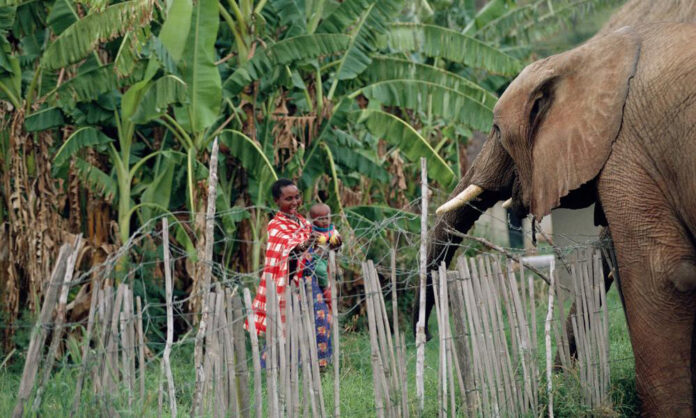The Human Wildlife Co-Existence Research Network (HWCRN) has launched in Eastern Africa to promote multi-stakeholder collaborations and bolster progress on human-wildlife relationships on the continent.
In Africa, the persisting human-wildlife conflicts pose growing challenges to both wildlife conservation efforts and the safeguarding of local communities’ livelihoods. Despite the numerous research and mitigation policies addressing human-wildlife conflicts, African governments and wildlife conservation organisations still encounter persistent challenges with human-wildlife interactions. These challenges include the development and execution of wildlife-conflict mitigation policies, which often lack scientific knowledge and community perspectives.
Led by a team of African scholars from top-tier research universities in the United States (Oregon State University, Pennsylvania State University and the University of Vermont), the Research Network has launched to foster traditional and scientific knowledge-driven policy solutions enhancing human-wildlife co-existence in Eastern Africa. The research network also includes collaborators from universities in East Africa, such as Makerere University in Uganda, Moi University in Kenya, Sokoine University of Agriculture in Tanzania, and future partner universities and institutions. The creation and management of the Network is supported by UK-based consultancy, Shared Planet.
The HWCRN is an innovative multi-stakeholder platform whose mission is to improve human-wildlife relationships in the region – specifically tailored to and focusing on Africa, starting with East Africa but then extending to other parts of the continent post-2025. The HWCRN brings together a diverse range of stakeholders to foster collaboration, learning and enhanced solutions addressing human-wildlife coexistence in Uganda, Tanzania, Rwanda, and Kenya. This includes a significant emphasis on empowering local communities in the development and implementation of wildlife co-existence policies. The HWCRN seeks to foster science-based decision-making that balances wildlife conservation with East African communities’ needs and aspirations. The HWCRN aims to showcase the stories and lived experiences of the people involved in wildlife management on the continent, including conservationists, local community members and wildlife managers.
Dr. Edwin Sabuhoro, an Assistant Professor of Recreation, Park, and Tourism Management and African Studies at the Pennsylvania State University and a co-founder of the HWCRN, said: “The issue of human-wildlife conflict in Africa calls for the development of a new model that takes into account the environmental factors of the continent. This model should involve all stakeholders in human-wildlife co-existence and promote effective sharing of knowledge and capacity-building efforts. By creating an African-specific approach, we can address this complex issue in a comprehensive and inclusive manner”.
Through the HWCRN online knowledge platform, existing knowledge and new insights on HWC are publicly available to increase awareness of best practices and knowledge about emerging human wildlife interaction challenges and solutions to foster co-existence. Importantly, the website includes a knowledge hub featuring peer-reviewed scientific publications, policy documents, reports, and other documentation of potential value to the different actors involved in the human-wildlife ecosystem in Eastern Africa. Organisations and individuals at the frontline of human-wildlife conflicts, including those in academia, government, non-profits, community-based, and private sector, are welcome to join the Network.
Dr. Ida Djenontin, a human-environment and development geographer, Assistant Professor in the department of Geography at the Pennsylvania State University and a co-founder of the HWCRN, said, “We want this to be an inclusive network where all stakeholders have the opportunity to come together, learn from one another and share best practices. We also want to leverage transdisciplinary approaches to co-create knowledge relevant for science-based policy on human-wildlife co-existence in the region. In doing so, we will embrace hitherto neglected dimensions of governance and institutions as a lens through which the pervasive conflicts can be examined.”
The establishment of country-level Chapters within East African and broader African countries is an important step in the direction of creating the HWCRN across Africa. The HWCRN aims to cultivate a positively transformative impact on human-wildlife coexistence through collaborative knowledge sharing and engaging key organizations, such as wildlife management authorities, nongovernmental conservation organizations, community leaders and groups, and academic institutions. At the end of July 2023, the HWCRN held its inaugural workshop in Kampala, Uganda and created its first national chapter in Uganda. In the summer of 2024, the HWCRN will expand to Tanzania to build its Tanzanian Chapter. Rwanda and Kenya Chapters will follow in 2025.
Dr. Ian Manunara, an Associate Professor of Forest Ecosystems and Society at Oregon State University and a co-founder of HWCRN, confirmed that
“Establishing our Research Network signifies a pivotal step towards harmonious human-wildlife coexistence in Africa. By uniting wildlife practitioners, academics, and local communities, we not only foster trust and collaboration but also empower frontline practitioners with science-driven policy solutions, bridging academia and practice gaps and ensuring that local perspectives informed science is accessible to policymakers and guides impactful policymaking and ultimately enhances the well-being of both people and wildlife.”
Information and membership applications to the HWCRN are available via its website at www.hwcrn.org.
______________________________
About the HWCRN: The Human-Wildlife Co-existence Research Network (HWCRN) for Africa is a multi-stakeholder platform on human-wildlife relationships in East Africa. It brings together diverse stakeholders, including researchers, practitioners, individuals with lived experiences, and policymakers, to collaborate, educate and better manage human-wildlife relationships in Uganda, Tanzania, Rwanda, and Kenya.
For additional media enquiries, interview opportunities or information on the HWCRN, its work and membership, please get in touch with Megan Simpson (megan.simpson@sharedplanet.co.uk) or Jean-Michel Betran-Makosso (jeanmichel.betran-makosso@sharedplanet.co.uk).
















 The African Research (AR) Index is a comprehensive scholarly directory and database focused explicitly on journal publishers that publish and disseminate African research.
The African Research (AR) Index is a comprehensive scholarly directory and database focused explicitly on journal publishers that publish and disseminate African research.

